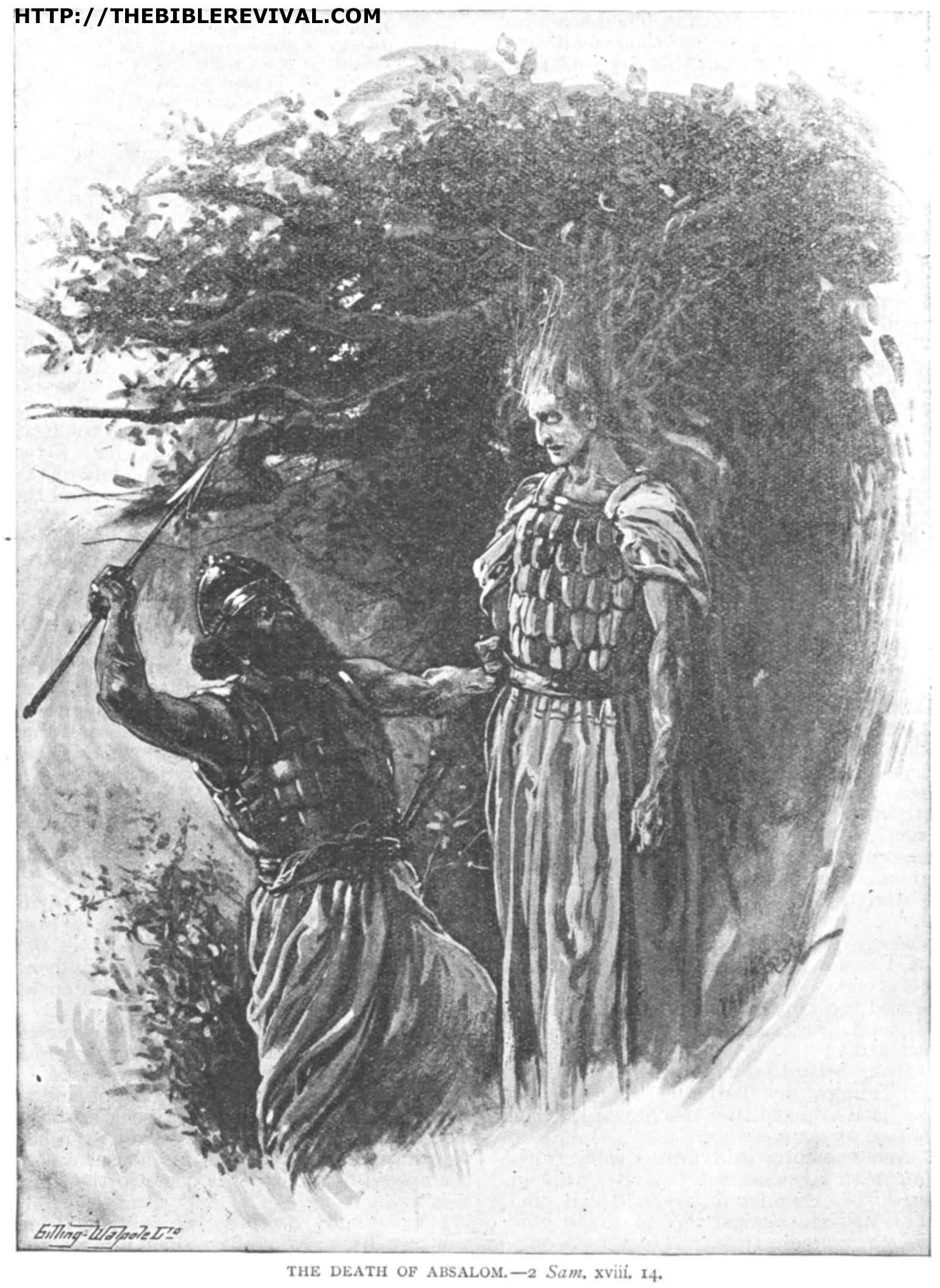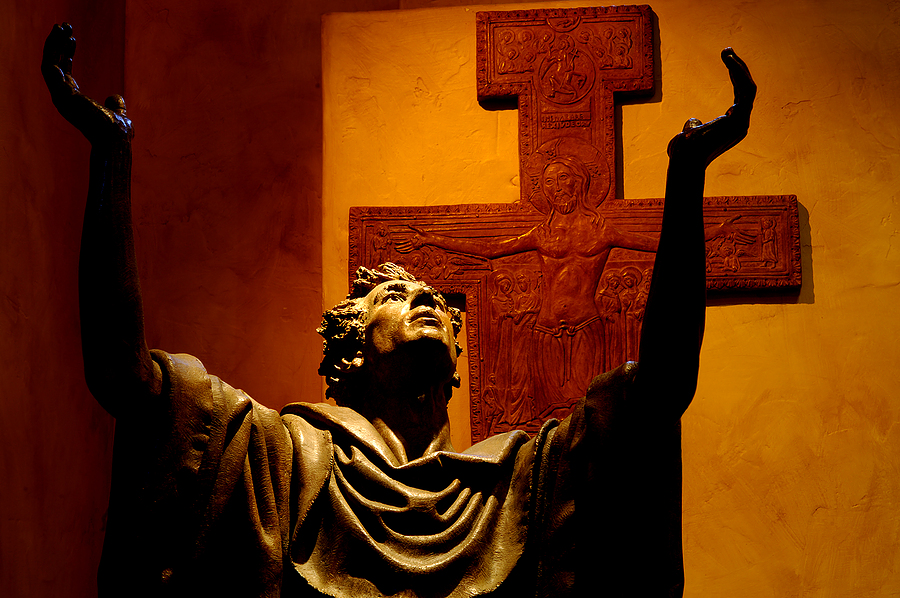 One of my favorite stories in the bible has to do with Absalom and David. In case you don’t know the story. Absalom seeks David’s throne and so he is a revolutionary against the King seeking to stage a coup where he will be king. There is one complication to this, Absalom is David’s son.
One of my favorite stories in the bible has to do with Absalom and David. In case you don’t know the story. Absalom seeks David’s throne and so he is a revolutionary against the King seeking to stage a coup where he will be king. There is one complication to this, Absalom is David’s son.
The revolutionary in seeking the final battle with his father, ends up stuck when going under a tree, his hair gets caught. His horse continues going and, therefore, the revolutionary son is caught between the tree and the ground. He cannot be in a more vulnerable place. David’s loyal soldiers find him and kill him. Now they have to inform the king that his enemy is dead, but that enemy is also his son. They send a messenger. David is waiting for good news, which to him is that his son although disarmed is still alive. He learns that the good news to David’s men, that his enemy is dead, is not the good news of the king, which is his son is dead.
David learns the truth and as he does so many times, he kills the messenger.
It is a fascinating story that is a precursor to the mercy of God, although the son rebelled, he is still the king’s son.
If there is one lesson I have learned in my later years of faith, it is the mercy of God. In fact, in Rome, the Pope quoted St. John Vianney who said that our sins are like grains of sand in comparison to God’s mountains of mercy. His mercy is endless and, therefore, it is both available to us and it is the message we have for the world, know God and his mercy.
Pope quoted St. John Vianney who said that our sins are like grains of sand in comparison to God’s mountains of mercy. His mercy is endless and, therefore, it is both available to us and it is the message we have for the world, know God and his mercy.
This was not always my understanding of God, previously growing up, the teaching was more that God was to be feared, that he would cast us into hell for the slightest imperfection. This has never been the message that God gives to us.
Today in the Gospel we see a lesson on mercy that also contradicts the human understanding of judgement.
The Samaritans were enemies of the Jews, because they practiced what the Jews considered a less pure form of the Judaism. There is a history of the Jews of rejection of the Samaritans. The Samaritans who actually came to existence as a result of the Assyrian empire conquering the Northern Kingdom of Israel. The Samaritans were the diaspora who married with the gentiles around them, forbidden in Jewish circles.
 The apostles, being Jews, did not have a fondness for Samaritans in the first place and Samaritans did not have a fondness for the Jewish Apostles nor Jesus. So for this reason the Samaritans reject Jesus and the Apostles and The 3 call for judgement. However, Jesus speaks of mercy.
The apostles, being Jews, did not have a fondness for Samaritans in the first place and Samaritans did not have a fondness for the Jewish Apostles nor Jesus. So for this reason the Samaritans reject Jesus and the Apostles and The 3 call for judgement. However, Jesus speaks of mercy.
Judgement is a last resort, it is when mercy is of no use. The apostles have yet to hear this.
Today, we hear people, often like the apostles, calling for judgement on this person or that. However, Christ calls us to show mercy, for it is through loving mercy that the most hardened of sinners can change. If you’ve seen the movie Dead Man Walking, you can see that it was through love that Sister Helen Prejean brings repentance and mercy, judgement in the form of the state did not bring repentance. However, it was not the role of the state to bring repentance for a condemned criminal, it is the role to exact justice. Sister Helen saw her role to bring mercy, where the state does not. The fruit of this action was repentance to bring salvation, even if it does not bring temporal freedom. But is that not our mission.
David killed the messenger who brought him the news that his enemy was dead. The king’s men successfully judged Absalom and found him to be a criminal. David wanted mercy that he could have his son back, his men gave him judgement, without mercy.
Mercy is not permissiveness, indeed, mercy can be harsher than punishment. I know a probation officer who many consider to be a nightmare, she is so strict. Her response is that probation is not permissiveness it is a time to bring someone to change their ways before things get worse. For that reason, she says, for many it is easier to do time than to do probation and she makes no apologies for it.
Remember condemnation is permanent, mercy calls for a change of heart before that happens.
Victor Frankl in his Man’s Search for Meaning writes about his life in the concentration camps and in how he survived. He tells of a vicious prison guard who after the war was caught and sentenced to prison. There in prison he had a severe change of heart and as such became a man who was of great support to other prisoners. Yet, when he was a guard, had he died, many of his prisoners would have partied.
survived. He tells of a vicious prison guard who after the war was caught and sentenced to prison. There in prison he had a severe change of heart and as such became a man who was of great support to other prisoners. Yet, when he was a guard, had he died, many of his prisoners would have partied.
The most intense image I have of Martin Luther King is not one who gave his I have a dream speech, or who marched for an end to an American form of Apartheid, it was when in Alabama, he was beaten and thrown into prison. There in prison he got down on his knees and prayed for the police officer who beat him.
These are all elements that reflect God’s mercy over his judgment, the mercy that you and I have a calling to reflect. The next time you hear of someone demanding judgment maybe over a divorced Catholic, over a man or woman struggling with living the faith under strong temptations to one sin or another, the criminal who seeks to change, the gang member against whom all have lost hope, whatever the case, remember, you and I have a call to reflect the reality of God’s mercy that hearts may change. The least we can do is pray. In fact, St. Theresa the Little Flower is well known for successfully praying for the conversion of a condemned criminal. We have no call to bring forth God’s judgement. It is God who brings forth His judgment not us, (cf Romans 12:19) when His mercy is to no avail, but that is His call, not ours.
God bless you,
Fr. Robert J Carr
Photo Credit: all public domain except bottom.
Bottom: rinderart via bigstockphoto.com
Sodom and Gomorrah painting: John Martin

